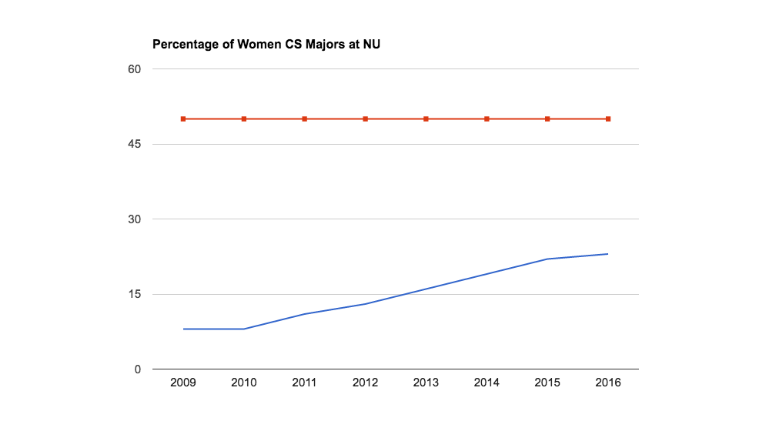CCIS plans to reach equal male-female enrollment
January 25, 2017
Northeastern University’s College of Computer and Information Science (CCIS) plans to reach equal enrollment for men and women studying computer science by 2021 through a plan set forth by CCIS Dean Carla Brodley.
Since Brodley became dean in 2014, female CCIS enrollment has jumped from 19 percent to 26 percent in 2016, said Doreen Hodgkin, the associate dean of administration and student affairs.
“There truly needs to be more diversity in computer science, which is why we are making all these efforts to have more female computer science students,” Hodgkin said.
The department’s outreach plan to reach the 50/50 mark includes special programs for local high school girls and conferences for current women in the CCIS program. In addition, they hope to recruit more women through general outreach strategies aimed at graduate students and undergraduates in seemingly unrelated majors.
Hodgkin said CCIS admissions staff directly reach out to female high school students in the Boston area through a weekly Saturday program called Girls Who Code.
“We teach the girls basic coding skills and just try to expose them to the idea of women studying computer science,” Hodgkin said. “Female faculty teach the girls, and I think it’s working—many of the girls are now current Northeastern computer science students.”
Brodley and the CCIS admissions office also take current female college students to conferences to empower and encourage them to pursue computer science. Hodgkin said that CCIS faculty always take a large group of women to the Grace Hopper Celebration of Women in Computing, an october conference designed to bring women in computer science together to discuss research and career interests.
“Tickets for these go out like Beyoncé concert tickets—all 15,000 of them gone in less than an hour,” Hodgkin said. “The girls go and come back feeling so empowered and inspired, as they hear from women leaders in the field. They end up telling their friends about the conference, and then their friends get interested.”
Jessica Biron, assistant director of undergraduate programs, said that CCIS has expanded general interest in computer science through combined majors which attract students from different fields of study to CCIS.
“Today, programming is the new literacy,” Biron said. “You can connect it to fields that seem totally unrelated, like English.”
The various computer science combined majors are exactly what drew freshmen computer science major Alyssa Lukpat to Northeastern and CCIS.
“When I applied to college, I had difficulty in choosing what major I wanted to study,” Lukpat said. “It just seemed like a hasty commitment. When I heard I could combine computer science and journalism at Northeastern, I was elated. I could pursue two passions at the same time, so I was set on going to Northeastern.”
Though Lukpat is on a different track than when she first set foot on campus, now concentrating in cyber operations rather than doing a combined major in journalism, she said she truly was drawn to Northeastern by the many CCIS combined majors and encouraged other students to “just try out a basic computer science class.”
Brodley and the CCIS admissions office have also increased recruitment efforts for graduate students who earned their undergraduate degrees in something other than computer science. Graduate students can go through the ALIGN program, which allows them to take bridge courses that build off of their undergraduate experience and help them get up to speed in computer science.
“The approach is similar to combined majors, as students connect their previous studies to computer science,” Biron said. “We just really want graduate students to know it’s never too late to integrate something new into their studies.”
Northeastern computer science professor Clark Freifeld said there needs to be more diversity in computer science. Freifeld teaches his students about the gender gap in computer science, as well as racial disparities within the field, on the first day of class each semester. He said he shows his students graphs with data from the Computing Research Association that show about 15 percent of computer science jobs are held by women, and only about 26 percent of computer science students at Northeastern are women.
“There’s this weird belief surrounding computer science—people just inherently seem to believe it’s only for men,” Freifeld said. “Women are desperately needed in computer science, which is why I want everyone to know how needed they are. I want to make everyone feel welcome.”
Lukpat, who is in one of Freifeld’s fundamentals of computer science lectures, said his introductory lesson on the need for diversity in CCIS made her feel accepted.
“To have a professor encourage us to embrace diversity within the first five minutes of class meant so much to me,” Lukpat said. “Northeastern’s computer science department is truly a special place to learn. I felt empowered and excited to be a woman of color in computer science.”
Graphic courtesy Clark Freifeld, Northeastern University College of Computer and Information Science







